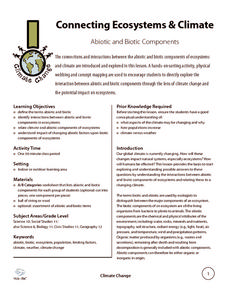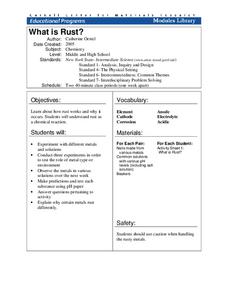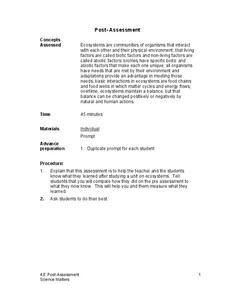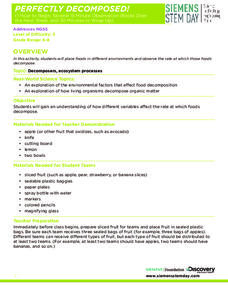Curated OER
Wipe Out
Learners examine the flow of water. They observe and test the properties of water by using sticks in flowing water. The instructional activity has streaming video, resource links to access, and a good hands-on activity that is clearly...
Curated OER
It's a Gas! Or is it?
Oceanography enthusiasts are given a series of thought experiments to consider in order to relate the solubility of gases and solids to underwater volcanoes. It is not particularly engaging to perform these thought experiments. Choose...
Curated OER
Sort the Compost Bin
Students discover what compost is. In this composting lesson, students view a sample of a compost bin and define what the purpose of compost is. Students discuss what the compost bin consists of and sort the compost bin into the green...
Wild BC
Connecting Ecosystems & Climate
Collaborators sort a set of cards into biotic and abiotic categories. Then, as a class, they discuss their work and relate each of the abiotic components to climate change. Finally, they form a web of components by connecting those that...
Center for Learning in Action
Water—Changing States (Part 1)
Here is part one of a two-part instructional activity in which scholars investigate the changing states of water—liquid, solid, and gas. With grand conversation and up to three demonstrations, learners make predictions about what they...
University of Colorado
Rings and Things
Galileo first observed Saturn's rings in 1610. Through the use of a flashlight and baby powder, classes see how they can observe the rings of the outer planets from far away. Another demonstration shows how these rings, made of ice and...
Cornell University
What Is Rust?
Why do metals rust differently? Scholars experiment with metal combinations in a hands-on activity. They create unique environments with different metals and compare the rate and amount of rust for each.
Curated OER
Properties of Fresh and Sea Water
Students work with three stations to demonstrate the properties of water. They explore water's boiling point, freezing point, and its ability to store heat.
Curated OER
Polymers all Over the Place
Young scholars investigate properties of common molecules. In this chemistry lesson plan, students construct polymer models to gain a better understanding of the properties of polymers.
Curated OER
Busted Bubbles
Using the scientific method, and bubble gum, learners conduct a motivating experiment. After conducting a series of tests involving bubble gum, they graph and analyze their results. This is the type of activity everyone loves.
Curated OER
Pond Ecology
A lab activity is a great way to incite thoughtful questioning and scientific processes. Pupils will collect organisms with a Petri dish, make observations, sketch the organism, ask questions, then attempt to identify the specimen...
Lerner Publishing
Teaching Habitats
What makes up a habitat? Use this resource to engage first graders in the exploration of desert, wetland, forest, and ocean habitats. Youngsters classify plants and animals into the four distinct habitats through drawings and cutting and...
It's About Time
Oil and Gas Production
Would you consider a power failure a current event? This lesson uses multiple experiments, guided inquiry activities, and group discussions to cover the topics of oil and gas production. This is the seventh lesson in a series of eight.
Space Awareness
The Big Meltdown
Explore the world (our world) of melting ice caps. Why are these caps melting? What is the effect of melting ice caps? Dive into the ever-present issue of global warming with a resource that has learners looking at data and participating...
NOAA
Invent a Robot!
Wait til your class gets their hands on this! Aspiring engineers design a working robotic arm in the fifth and final installment in a series of ocean exploration lessons. Pupils learn about the use of underwater robots in ocean...
Science Matters
Ecosystem Pre-Assessment
Test scholars' knowledge of ecosystems with a 20-question pre-assessment. Assessment challenges learners to answer multiple choice questions, read diagrams, and complete charts.
Science Matters
Post-Assessment
Twenty questions make up an assessment designed to test super scientists' knowledge of ecosystems. Scholars answer multiple-choice and short-answer questions about organisms, food chains, energy flow, and more.
Howard Hughes Medical Institute
Modeling Food Webs in Darién, Panama
It's a jungle out there! Young biologists journey to Darien, Panama to examine the intricate relationships between the organisms that inhabit the jungle. Groups begin by demonstrating an understanding of energy flow in ecosystems, then...
Discovery Education
Perfectly Decomposed!
We all know someone who won't eat the banana with a brown spot, the grape with a dimple, and the apple with a bruise. Scholars use different fruits to explore what happens when fruits really start to decompose. They set up an experiment...
Curated OER
Wetland Metaphors
Young scholars describe the characteristics of wetlands and identify their ecological functions. They inspect items and use them to create metaphors about wetlands.
Curated OER
Recycled Paper
Sixth graders keep track of the amount of paper they consume on a daily, weekly, and monthly basis. The goal of the lesson is to have them all find ways to reduce the amount they use. Everyone creates recycled paper from old newspapers...
Curated OER
Chemical Consequences of Burning Fossil Fuels
Future scientists are introduced to the chemical consequences of burning fossil fuels, learning that fossil fuel combustion leads to the formation of oxides of three nonmetals: carbon, nitrogen, and sulfur, all of which end up in the...
Curated OER
Dining Out With Fishes and Birds of the Hudson
While this instructional activity focuses on the birds and fish found on the Hudson River, it could be adapted for use in any classroom. Using a vocabulary list, learners explore the meaning of words like adaptation, habitat, barbel, and...
Curated OER
Earth's Water
If the majority of our planet is covered with water, why do we need to bother conserving it? With a thorough and varied investigation into the location and types of water on the earth, learners will gain an understanding of why this...

























